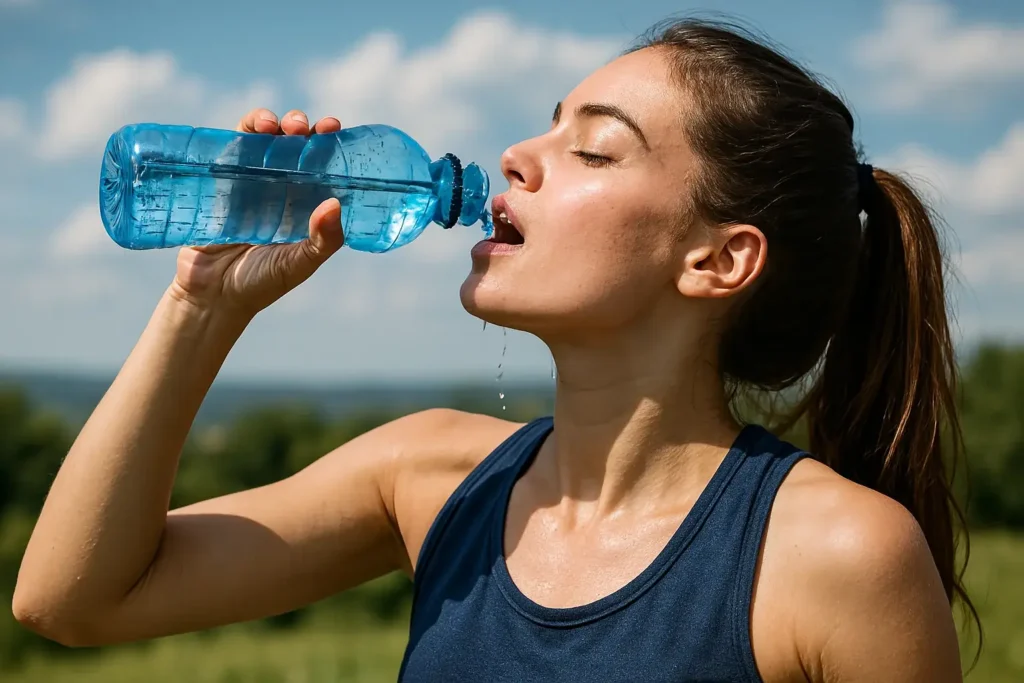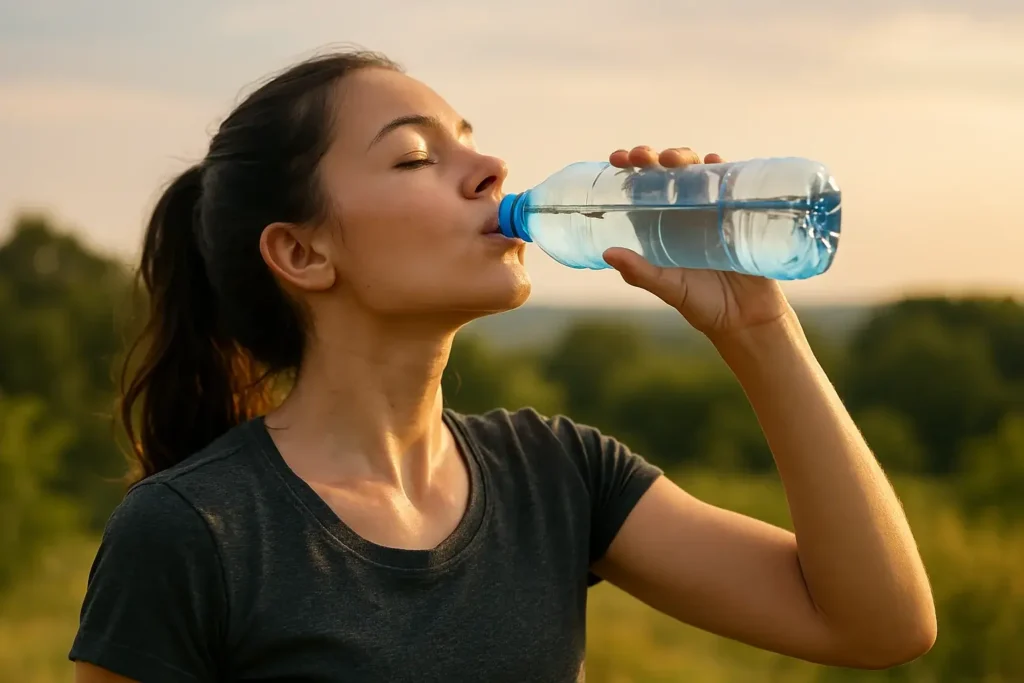Hydration Calculator: How Much Water Do You Need to Drink in a Day?
Hydration Calculator—How Much Water You Need Daily!
Introduction
We all know water is essential, but how much do we need daily? You’ve probably heard “8 glasses a day,” but is that a one-size-fits-all solution? Spoiler alert: It’s not. Our bodies are as unique as our fingerprints, and how much water you need depends on various factors—from your weight to your workout routine. That’s where a hydration calculator can be a game-changer.
In this article, we’ll explain everything you need to know about daily water intake, why it matters, how to calculate it, and tips for staying hydrated without making it a chore. So grab a glass of water (see what we did there?), and dive in.

1. Why Is Hydration So Important?
Water is like the oil in your car engine—things break down fast without it. About 60% of your body is water, which plays a role in almost every bodily function: regulating temperature, aiding digestion, lubricating joints, and more. Dehydration impairs bodily function.
2. The Myth of 8 Glasses a Day
You’ve heard it a thousand times: Drink eight glasses of water daily. While it’s a decent baseline, it doesn’t work for everyone. Think of it like prescribing the same shoe size to everyone—some will be fine, others will be limping. Your water needs are personal.
3. What Is a Hydration Calculator?
A hydration calculator is a simple online tool that estimates how much water you should drink daily. It calculates a personalized hydration goal based on weight, age, gender, activity level, and climate, offering a pocket-sized hydration coach.
4. Factors That Influence Your Water Needs
Several factors determine how much water your body requires:
- Body Weight: Larger bodies need more water.
- Age: Hydration needs vary between children and older adults.
- Gender: Men often need more water than women due to higher muscle mass.
- Activity Level: Sweat more, replenish more.
- Climate: Hot or humid weather increases your water loss.
- Health Conditions: Illnesses, medications, and pregnancy can increase water requirements.
5. How to Use a Hydration Calculator
Using a hydration calculator is easy:
- Enter Your Info: Weight, age, gender, activity level, and climate.
- Get Your Results: Your recommended daily water intake.
- Track Your Intake: Use apps or a journal to stay on target.
Calculators also allow adjustments based on special conditions like pregnancy, breastfeeding, or health issues.
6. Hydration Needs by Age and Gender
Here’s a general guide, but always check your personalized hydration number:
- Children (1–8 years): 4–7 cups
- Teens (9–18 years): 7–11 cups
- Men (19+): 13 cups (3 liters)
- Women (19+): 9 cups (2.2 liters)
- Pregnant Women: About 10 cups
- Breastfeeding Women: Around 13 cups
Remember, these are averages. Your needs may differ based on other factors.

7. Hydration for Active Lifestyles
You need more water to hit the gym or run a marathon. Exercise increases sweat and requires fluid replenishment.
Tip: Weigh yourself before and after a workout. Drink 16-24 oz of water per pound lost.
8. Water Intake in Different Climates
Living in a hot or dry climate causes your body to lose water faster, even if you’re not sweating buckets. The same goes for high altitudes.
Increase daily fluid intake by 0.5–1 liter in extreme heat or dry conditions.
9. Signs You’re Not Drinking Enough Water
Your body is good at sending SOS signals when it’s low on water. Watch for:
- Dry mouth and lips
- Dark yellow urine
- Headaches
- Dizziness or fatigue
- Constipation
- Dry skin
If you’re feeling “off,” it might not be coffee you need—it’s probably water.
10. Signs You’re Drinking Too Much Water
Yes, you can overdo it. It’s called water intoxication, and it dilutes the sodium in your blood.
Warning Signs:
- Nausea
- Confusion
- Swelling (especially in hands, feet, or lips)
- Headaches
Stick to your calculated needs, and don’t go overboard.
11. Creative Ways to Stay Hydrated
Not a fan of plain water? No problem.
- Infused Water: Add cucumber, lemon, or berries.
- Herbal Teas: Naturally caffeine-free and hydrating.
- Hydrating Snacks: Watermelon, cucumber, and oranges are your friends.
- Hydration Apps: Track your intake with a friendly nudge.
12. Does Coffee or Tea Count?
Yes and no. While caffeinated drinks can contribute to fluid intake, they’re also diuretics (meaning they increase urine output).
Balance Tip: One cup of coffee counts, but don’t rely on it for hydration. Aim for more water-based beverages.
13. The Role of Food in Hydration
Did you know about 20% of your daily water intake comes from food?
- High-Water Foods: Lettuce, celery, tomatoes, strawberries, yogurt
- Soups and broths: A delicious way to hydrate
Eating water-rich foods is like sneaking water into your diet without even noticing.

14. Hydration and Health Conditions
Certain conditions demand closer attention to hydration:
- Kidney Stones: Staying hydrated can prevent recurrence.
- Urinary Tract Infections (UTIs): Water flushes out bacteria.
- Diabetes: Excess urination increases fluid loss.
- Heart Conditions: May require controlled fluid intake.
Always consult a healthcare provider for personalized advice if you have a chronic condition.
15. Final Thoughts on Hydration Habits
Hydration isn’t about chugging gallons of water every morning. It’s about listening to your body, making small changes, and staying consistent. Use a hydration calculator as a tool, not a rule. Staying hydrated can become second nature with just a bit of awareness and effort.
Frequently Asked Questions (FAQs)
1. How much water should I drink in a day?
It depends on your weight, activity level, climate, and health status. A hydration calculator can give you a personalized number, but most adults need between 2 and 3 liters daily.
2. Can I drink too much water?
Yes, overhydration can lead to water intoxication, causing nausea, headaches, and even more severe issues like brain swelling in extreme cases.
3. Do I still need to drink water if I’m not thirsty?
Thirst isn’t always a reliable indicator, especially in older adults. It’s better to sip water throughout the day than to wait until you feel thirsty.
4. Does soda count toward hydration?
Technically, yes, but sugary sodas aren’t ideal. They can dehydrate you over time and come with other health risks. Water is always the best choice.
5. What’s the best time to drink water?
Spread your intake throughout the day. Start with a glass in the morning, drink before meals and during workouts, and sip regularly to avoid dehydration.
Want to know exactly how much you should drink today? Try a hydration calculator—your body will thank you.
Learn: Heatstroke vs. Heat Exhaustion: What’s the Difference?